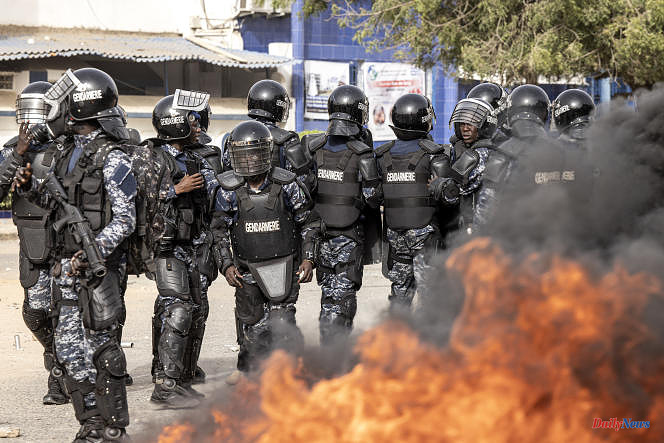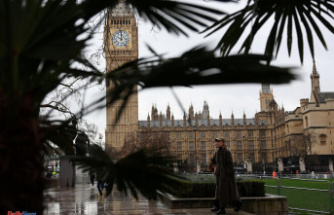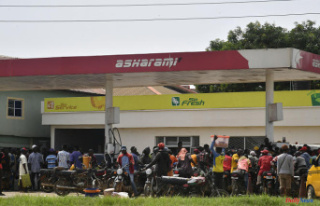All the streets leading to the home of opponent Ousmane Sonko in Dakar are closed by red and white barriers, guarded by the police. Around, life more or less follows its course in the Cité Keur Gorgui district despite the palpable tensions. At each intersection, pick-ups are parked and police stop the motorcycles, which are prohibited from driving until the evening of Thursday June 1 "for security reasons".
Here, like everywhere else in the capital, everyone is awaiting the deliberation of the trial of Ousmane Sonko, accused of repeated rapes on the person of Adji Sarr, a former employee of a massage parlor, which must be pronounced in the Thursday day. On May 24, the prosecutor requested ten years in prison for rape or five years for youth corruption against the opponent.
Ousmane Sonko, who was recluse at the time of his trial in his stronghold of Ziguinchor, the southern city of the country of which he is mayor, has since been "forced back" to his home in Dakar on Sunday. The declared presidential candidate of 2024 denounces a plot to condemn him and remove him from the political game. "We will not accept a conviction in an empty file", launches the deputy of the opposition Guy Marius Sagna, for whom the objective is that "Ousmane Sonko recovers his rights".
"People are tired"
For several days, scuffles have broken out in the capital between the police and groups of supporters of the leader of the African Patriots of Senegal party for work, ethics and fraternity (Pastef). Houses of executives of the presidential majority were attacked and tires burned on the main axes of Dakar. Violence that many fear will intensify if Mr. Sonko is convicted. As a preventive measure, classes at the Cheikh-Anta-Diop University (UCAD) in Dakar are suspended, as well as in several schools.
"Young people are mobilized because Mr. Sonko is their leader, they come out to defend him," says Awa Fall, who sells sweets and donuts outside a school near the political leader's residence. At each judicial hearing of cases concerning Ousmane Sonko, prosecuted in two cases, one for rape and the other for defamation, Dakar takes on the face of a quasi ghost town and the saleswoman has seen her activity bear the brunt of it for more than two months. .
“A lot of children don't come to school on trial days because the parents are scared. So they prefer to keep them at home. It doesn't help our business, because they are the ones who buy our sweets, ”says the shopkeeper, mother, who has worked here for five years. “People are tired. »
A little further, Moustapha Gueye, 34, sells pens, calculators and school books on his stall. Its products have already been destroyed at the time of one of Mr. Sonko's defamation hearings. “Over the past two years, I have lost many working days due to protests and clashes. All these stories do not concern us directly, but it ends up having an impact on the population, and especially on the poorest who suffer from the situation, ”says the father of three children.
Everyone therefore fears this day of verdict, as the tension mounts. The day before, a delegation of opposition deputies, led by Guy Marius Sagna, tried to approach the house of Ousmane Sonko, without success. Very quickly, they were driven away by tear gas canisters and one of them, Birame Souley Diop who is president of the parliamentary group of the opposition coalition Yewwi Askan Wi, which includes Pastef, was arrested.
"Basic Rights"
Earlier in the week, Mr. Sonko's lawyers tried to visit his home but were prevented from doing so by law enforcement. “These are very serious facts. A measure restricting freedom can only be ordered by a judge, so it is illegal,” comments Bamba Cissé, one of Ousmane Sonko’s lawyers. “We are not bound to obey any illegal act. And this blockade around the house is illegal, so we call to resist, to fight and to mobilize, "claims MP Guy Marius Sagna.
The Ministry of the Interior refuses for its part to speak of "blockade" and invokes a "question of public order and national security" while the role of the State is to "ensure the safety of people and their goods. »
In this tense political climate, President Macky Sall launched a national dialogue on Wednesday, the day before the verdict. "The government will take all the necessary measures to organize a peaceful, democratic, free and transparent election", declared the head of state, while not lifting the vagueness on his candidacy for a third term, less than eight months away. of the election deadline. In his opening speech, he reiterated his commitment to "outlawing physical and verbal violence, as well as hate speech and stigma."
The platform of the Forces vives de la nation F24, which for the most part boycotted the national dialogue, tried to organize a parallel "people's dialogue", which failed to take place. “We went to a private house, the headquarters of a party, and the gendarmerie came to say that all gatherings were prohibited. Not wanting confrontation, we went back", testifies the coordinator of F24, Mamadou Mbodj, who keeps "a feeling of frustration, bitterness and regret, because we are in a country which calls itself the rule of law but does not respect not basic rights".












